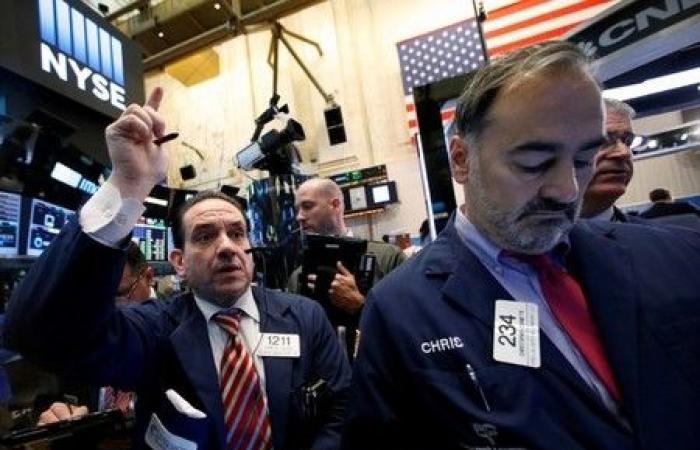Paris (awp/afp) – World stock markets fell on Tuesday, overcome by concern over the increases in customs tariffs promised by Donald Trump, when bitcoin was near peaks thanks to deregulation defended by the Republican.
Around 12:30 GMT, the European stock markets all fell sharply. Paris lost 1.38%, London 0.98% and Frankfurt 1.05%. Milan lost 1.04%.
“European investors are preparing for the impact of a customs duty of 10%” minimum on products entering the United States, a campaign promise of the future president, explains Stephen Innes, analyst at SPI Asset Management.
They thus erase the entirety of the net gains they had made the day before, an illustration of the volatility that has reigned since Donald Trump’s victory, with the markets oscillating between hopes of tax cuts and deregulation and fears of protectionism.
The barometer of investor morale in Germany in November, which fell unexpectedly in November according to figures published on Tuesday (-7.4 points), has not improved the mood on the European markets.
Especially since Chancellor Olaf Scholz’s coalition exploded last week and early elections will be held in February, against a backdrop of a stubborn crisis in the industrial sector of Europe’s largest economy.
On Wall Street, the indices should remain behind, taking a break after having accumulated records in recent days. In pre-session contracts, the Dow Jones lost 0.09%, the Nasdaq 0.10% and the S&P 500 0.13% around 12:30 GMT.
In Asia too, pessimism has won: Donald Trump has promised to increase customs tariffs of up to 60% for Chinese products, which should not help the situation of the second largest economy in the world, which has been sluggish for several months.
Hong Kong a perdu 2,84%, Shanghai 1,39% and Shenzhen 0,65%.
Especially since the new recovery measures announced by Beijing at the end of last week – an increase of 780 billion euros in the debt ceiling of local authorities – have not convinced the markets.
Bitcoin is reaching new heights
Bitcoin is trading at historic highs on Tuesday, having even touched $90,000, at $89,968, at the start of the session. Around 12:30 GMT, the asset reached $87,162.
For comparison, it was trading below $70,000 before the presidential election on November 5.
“Donald Trump will likely remove skeptics from government institutions and replace them with regulators favorable to cryptocurrencies,” notes Ipek Ozkardeskaya, analyst for Swissquote Bank.
Under a Trump presidency, with a Senate dominated by the Republican Party – also on course to win the House of Representatives – the United States could even adopt bitcoin as a strategic reserve asset.
On the foreign exchange side, the dollar continues to gain ground, benefiting from expectations of a more restrictive monetary policy due to the inflationary risks of the future American president’s program.
Around 12:30 GMT, the greenback gained 0.94% to 1.0609 dollars per euro. Interest rates on the benchmark ten-year American bond reached 4.36%, compared to 4.30% the day before.
Oil up limited
Oil prices are up slightly with the return of the risk of conflict between Iran and Israel, but remain contained by the prospect of excess supply on the oil market in the months to come.
Around 12:30 GMT, the price of a barrel of Brent from the North Sea, for delivery in January, rose 0.22% to $71.99. Its American equivalent, a barrel of West Texas Intermediate (WTI), for delivery in December, gained 0.19%, to $68.17.
ConvaTec convincing
The health products and technologies group ConvaTec, specializing in the management of chronic diseases, soared 20.87% around 12:30 GMT in London on Tuesday, recovering from a slow erosion of its stock over the last six months thanks to an improvement of its forecasts for this year and next.
Bayer dives
The German agrochemical and pharmaceutical giant Bayer plunged 10.81% around 12:30 GMT, after posting a net loss of 4.18 billion euros in the third quarter, weighed down by its agrochemical division, according to a press release on Tuesday. The Leverkusen group suffered from falling sales in the agricultural market, and above all from a depreciation of 4.09 billion euros in this division.
afp/jh






